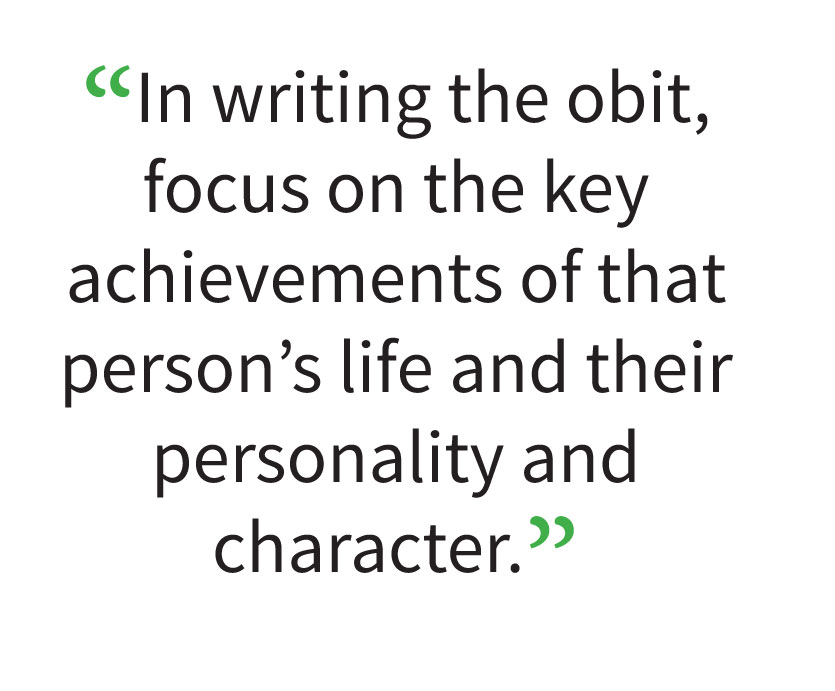Published in the September 13 – September 26, 2017 issue of Morgan Hill Life

We at Morgan Hill Life encourage local people who have lost a loved one to consider telling readers through our pages and on our website that beloved person’s story. An obit is an excellent way for the community to share the burden of loss with family and friends of the deceased. Writing and publishing an obit can be a form of grief therapy for the family, providing a narrative to the world about why that person was unique and why their life mattered.
 Very often in the turmoil following a loss, it can be emotionally difficult for a family to take time to write an obituary for publication. That’s why we encourage families with someone who might be terminally ill or who is elderly to ask them what they might wish to share about their life story to their local community. For some people, facing the specter of death and looking back on the years might be an uncomfortable exercise. But the reward will be in the revelations of what they saw as their accomplishments and highlights.
Very often in the turmoil following a loss, it can be emotionally difficult for a family to take time to write an obituary for publication. That’s why we encourage families with someone who might be terminally ill or who is elderly to ask them what they might wish to share about their life story to their local community. For some people, facing the specter of death and looking back on the years might be an uncomfortable exercise. But the reward will be in the revelations of what they saw as their accomplishments and highlights.
Start with a list of questions you might want to ask the person. Then make an audio or even video recording of the conversation. Ask about what it was like in their growing up years, how they met the love of their life, what they fondly recall about raising a family, and how they came to go into the life vocation they chose. Because the obituary tells a story of someone’s life, ask the loved one questions that uncover what it compelling and interesting.
Remember, an obituary is the last chance for a family to let the world know about the deceased person’s life and the contributions he or she made to the community. Asking the person ahead of their death what they might want the public to learn about them in a newspaper obit will make it easier to write their story after their life clock has ticked its last second.
In writing the obit, start by making a list of information you will want to include: Full name (including nickname), date and place of birth, date and place of death, the names of close family members, the loved one’s education and academic degrees earned, hobbies they felt passionate about, organizations including nonprofits they might have been active in, significant career activities, military service and highest rank obtained and their involvement in combat. Also include in your notes the location and date and time of the funeral service or memorial service if one is planned. If the family prefers not to have flowers sent, suggest a specific charity the loved one might wish funds to go to.
In writing the obit, focus on the key achievements of that person’s life and their personality and character. Pen the words in a simple straight-forward style. And after you revise the obit, have a friend proofread it for factual accuracy, and spelling and grammar typos.
Morgan Hill Life welcomes obituaries published in our print and web pages. You’ll find our service is cost competitive with other publications. If your family might prefer that a professional freelance writer prepare the obit, we can arrange someone to work with you.
Every life is a story. When someone special leaves your life, share their story with the community in the newspaper. It’s important in the process of grieving to take time to celebrate with your fellow residents who that unique individual was and what he or she did in a life story.







